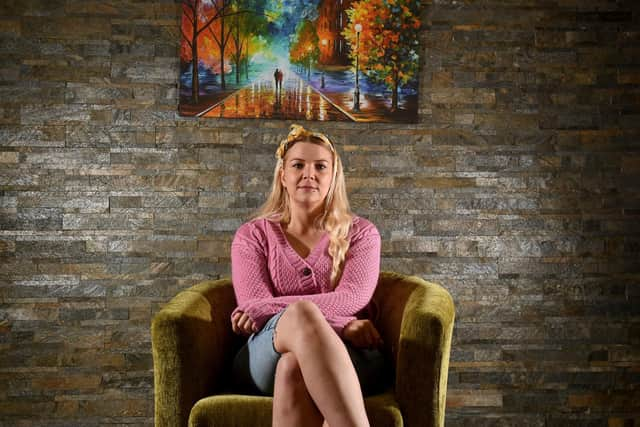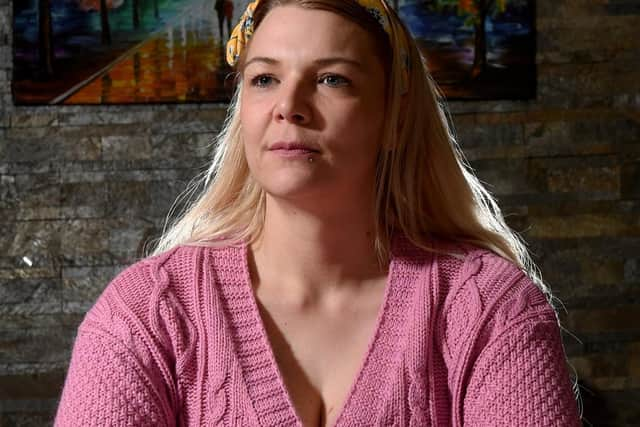Domestic abuse survivors demand answers over lack of Government funding and ask: 'Why are there more dog and cat homes than refuges for victims?'
The latest figures from the Home Office reveal that 82,412 domestic abuse-related offences were recorded in Yorkshire in the year up to March 2020. That is 17 per cent of all crimes recorded by police in the area that year.
While figures do not cover the Covid-19 pandemic, national domestic violence charity Refuge has seen a 61 per cent increase in calls to its helpline between April 2020 and February 2021 compared to the two months before lockdowns began.
Advertisement
Hide AdAdvertisement
Hide AdDespite the Government announcing £19 million of funding in the 2021 Budget - earmarked for programmes working with domestic abuse perpetrators and a £125 million package to help councils in England to provide therapy and support in safe accommodation, survivors and charities across Yorkshire state it quite simply is not enough.


Joanne Geary founded domestic abuse charity Break the Silence, based in Wakefield, back in 2019 as she wanted to use her own experience of domestic violence to help others. Its support workers take a personalised approach to helping victims, ranging from getting them into safe accommodation to online forums. The charity is now supporting around 400 people a month, but is self-funded having received no money from the Government.
Miss Geary said: "On paper it might look like a lot of money the Government is allocating, but in reality it is absolutely nothing, it's peanuts.
"When you live in a society where you've got more dog homes than women's refuges something is clearly wrong. What is the Government trying to say here? That these pets' lives are more important than women and children's?
Advertisement
Hide AdAdvertisement
Hide Ad

"Smaller charities like ourselves do not get any government funding.
"We are overworked and self-funded. At the moment I am working 70 to 80 hours a week. I created Break the Silence from a survivor's point of view as I wanted to throw back into the community what I know was lacking as a survivor myself.
"Our services are based on the client's individual needs, we don't treat them as a number. When I was in their situation there wasn't the relevant support I needed, I had to wait 18 months for counselling and as a result ended up back with my abusive partner."
Miss Geary is keen to raise awareness of coercive control after she suffered for years at the hands of an abusive partner.
Advertisement
Hide AdAdvertisement
Hide AdShe said: “Fear is control when you are a victim of coercive behaviour. I avoided wearing make up or certain clothes he didn’t like because of the fear of what would happen if I didn’t do as I was told. Coercive control is a life living on constant egg shells.
“I am a strong person but he managed to break me. I wasn't myself, I didn't know who I was and even after I left I still continued for some time living a life of a controlled woman. I had to break the cycle myself and learn to live independently again and that wasn't easy at all.”
She said: "It's really difficult and frustrating and it can get you down quite a lot because there's so much that we want to do, but it's finding the funding to do it.
"In an ideal world, the Government needs to sit down with people that have been through this so they have a better understanding of what it feels like from a survivor's point of view.
Advertisement
Hide AdAdvertisement
Hide AdMiss Geary's comments are echoed by that of another survivor and volunteer in the North east of England.
Katie, whose name has been changed to protect her identity, suffered abuse and violence for several years at the hands of her controlling partner.
She said: "At first everything was great and it was just a normal relationship, but slowly the control started and he started telling me what I could and couldn't wear and then the anger and the violence followed.
"At the beginning I used to challenge him about things, but then he started spitting in my face.
Advertisement
Hide AdAdvertisement
Hide Ad"He convinced me to give up my job, he isolated me. I also became his punchbag.
"He would tell me no one else would want me and that I would be in the gutter if it wasn't for him and after so many years of hearing this you start to believe it."
Katie's partner would beat her until she was black and blue.
She wasn't allowed to leave the house and in the morning he would wake her up by pouring hot or cold water on her.
Advertisement
Hide AdAdvertisement
Hide Ad"If I did try and go to a friend or family he would go and smash their windows in," she recalls.
"I didn't want to take trouble to their doors. I didn't know where to turn to, I hadn't heard of any refuges or foundations to help.
"I felt completely and utterly powerless. Towards the end I felt like giving up and I wanted his punch to be the last one."
It wasn't until her partner attempted to take her to a secluded area that Katie made her escape.
Advertisement
Hide AdAdvertisement
Hide Ad"Something inside me just knew that if I didn't get out I would die," she said.
"I jumped out of his moving car. I broke my foot doing it but I had to escape."
It was through a friend she was then informed of a refuge.
"I was still terrified, but I can't even sing the praises enough of what the refuge do for you. They guide and support you and if it wasn't for them I wouldn't be here today."
It was her own experience that led the 46-year-old to becoming a volunteer at the foundation.
Advertisement
Hide AdAdvertisement
Hide AdShe said: "I needed to scream and shout about how these people saved my life and I wanted to do the same for other women and children out there going through this.
"More people need to know about these services and what support there is."
Katie also believes the Government needs to do more to support organisations and charities who support victims of domestic abuse.
She said: "It is bizarre that in this country we have more homes for dogs and cats than refuges for women.
Advertisement
Hide AdAdvertisement
Hide Ad"Women come to us with nothing and we help them start from scratch, whether that be providing clothes and food, or furniture for accommodation.
"We are doing all the right things, we just need the funding to do more."
